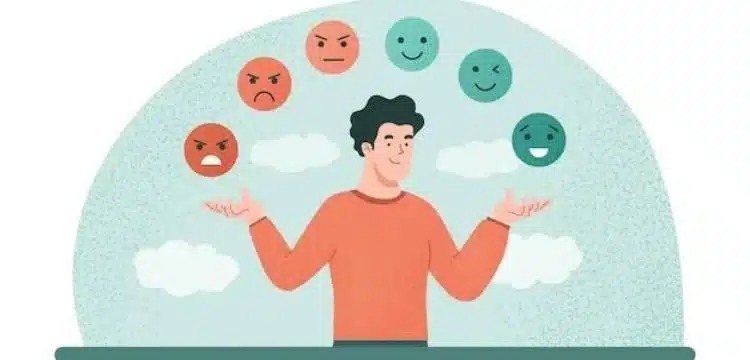[vc_row][vc_column][vc_column_text dp_text_size=”size-4″]Imagine being able to feel things and not being able to express them properly?
We may find people around us who channel both their positive and negative emotions in a very unusual way. Some may continue to take out their built-up childhood trauma on MMA fights and some may start shaking while projecting their happiness.
Not being able process and say out what’s in your heart may lead to subconsciously hurting oneself and the people around. According to the studies conducted by National Institute of Mental Health, approximately 1 in 5 individuals experience difficulties with emotional regulation.
According to the studies, The reported prevalence rates of child and adolescent’s mental health problems in Pakistan are much higher (35%) than the global prevalence estimates of 10–20% and the mental health disorders in teenagers is as high as 10%.
Emotional regulation refers to ability to effectively manage and control one’s emotions and express the appropriately. Children begin to develop rudimentary emotional regulation skills in infancy which continue to develop throughout childhood and adolescence.
So how does one learn that? One can develop the skill of emotional regulation gradually and here’s what we get to learn from philosophy regarding this. Stoic philosophy by Marcus Aurelius talks about how to observe emotions without judging them. It also refers to the practice of mindfulness, for example, if someone insults you, instead of reacting to that in a negative way, think of their actions as not a part of something you’re in control of and responsible for. Instead think of the things in your control.
“Choose not to be harmed – and you won’t feel harmed. Don’t feel harmed – and you haven’t been.”
-Marcus Aurelius.
This quote focuses on the things that are in our control rather than external events and perceptions. By choosing to not get affected emotionally by external factors, one can get emotional tranquility (Ataraxia).
Imam Ali a.s, a revered figure in the Islamic history, also talks about emotional regulation in the context of self-reflection, introspection and patience.
“Patience is of two kinds; patience over what pains you and patience against what you covet”
His wisdom provides a timeless guidance on how one can posses emotional regulation, he says that by getting a deep insight of your emotions and feelings one can become capable to regulate them. This process is called “Taddabur”. By engaging in introspection and thinking about oneself deeply, one can achieve wisdom and patience. He also emphasizes on trusting the divine power’s plan and to align ones will with the will of God to gain “tawakkul” hence become patient with the course of nature. His emphasis on self-awareness resonates through cultures.
“The one who controls his tongue, saves his head.”
- Imam Ali a.s
His teachings encourage teenagers to cultivate the virtues of resilience in the era of adversity.
Positive psychology also talks about emotional regulation by expressing emotions in sort of creativity, for example we see many famous artists portraying their personal battles and life struggles using their art. Vincent Van Gogh is highly famous for this. His famous “Starry Night” depicts the wonder and awe one can feel while experiencing something exponentially bigger and wondrous to look at. He focuses on how one can forget one’s pain by looking through things with a larger lens.
Emotional intelligence, a psychological concept by Daniel Goleman, puts forward the aspects the of self-awareness, self-regulation, empathy and social skills to gain emotional regulation. In his book called, “Emotional Intelligence: Why It Can Matter More Than IQ’, he discusses the process of attaining emotional intelligence.
This process by firstly observing your emotions, then managing them accordingly, then by observing the needs of others and by putting oneself in their shoes and actively listening to them without judgements and by building strong interpersonal relations through effective communication.
The CBT (Cognitive-behavioral therapy) focuses on observing the negative thought patterns and reframing them with a better, a more rational interpretation. The cognitive restructuring empowers people to take control of their mental well-being. For-example for a thought pattern that says “If I fail this exam, my life will be ruined”, a more rational thought pattern would be “If I fail this exam, I can retake that exam”. This cultivates a positive approach in a person’s life and they would not find themselves succumbing to challenges of life.
By thinking that your sadness, your anger or any emotion is highlighting a need of your body, both physically and mentally, you understand how to tackle that. Just like we seek medicines for physical pains, we should seek out professional help for emotional challenges, add a positive addition to the society and be there for our dear ones. Pakistani society has stigmatized the mental health disorders and the high prices of the professional therapists has resulted in many teenagers suffering alone and getting under the influence of drugs to overcome such issues.
The government must realize this grave issue and put forward reforms that help teenagers to solve these issues of mental health in an effective way. By opening free support centers for mental health, government can continue to deal with those in need.[/vc_column_text][/vc_column][/vc_row]











